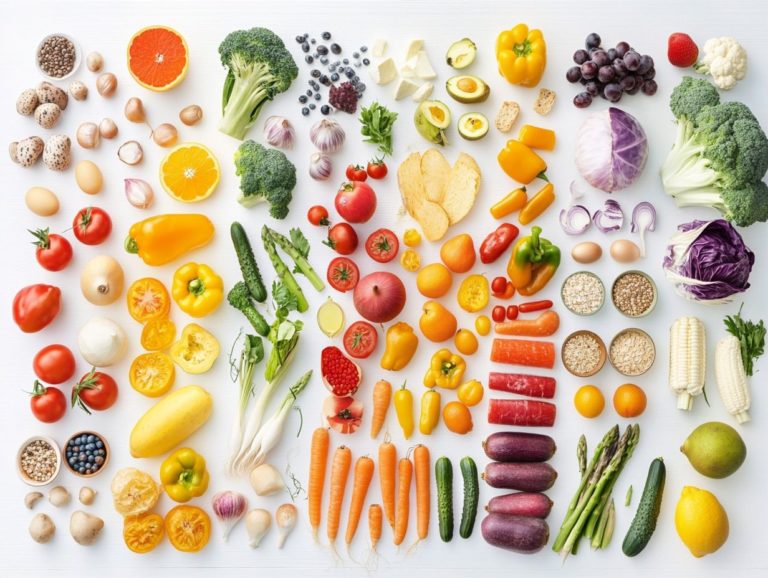Dietary Guidelines for Seniors: What to Know
As you age, your nutritional needs shift. It’s essential for seniors to follow personalized dietary guidelines.
This article explores key nutrients vital for maintaining health, along with recommended daily intakes designed specifically for older adults. It addresses common nutritional deficiencies, provides practical tips for healthy eating, and highlights considerations for specific health conditions.
You ll also find valuable resources for trustworthy nutrition information. Take charge of your health today for a brighter tomorrow!
Contents
- Key Takeaways:
- Why Dietary Guidelines are Important for Seniors
- Key Nutrients for Seniors
- Common Nutritional Deficiencies in Seniors
- Healthy Eating Tips for Seniors
- Special Considerations for Seniors
- Resources for Seniors
- Frequently Asked Questions
- What are the Dietary Guidelines for Seniors?
- Why are the Dietary Guidelines important for seniors?
- What are the key recommendations in the Dietary Guidelines for Seniors?
- Are there any specific nutrients that seniors should pay attention to?
- Do Seniors Need to Follow a Special Diet?
- How Can Seniors Meet Their Nutritional Needs on a Limited Budget?
Key Takeaways:

As we age, our nutritional needs change, so it’s important for seniors to follow dietary guidelines to maintain good health and prevent deficiencies. Key nutrients for seniors include protein, calcium, vitamin D, and fiber. Aim for a balanced, nutrient-rich diet to meet daily intake levels. Common deficiencies include vitamin D, calcium, and B vitamins, which can be addressed through nutrition and supplements if necessary.
Why Dietary Guidelines are Important for Seniors
Dietary guidelines promote healthy eating among older adults. They help you meet your unique nutrient needs while reducing the risk of chronic diseases like heart disease, osteoporosis, and cancer.
These guidelines emphasize a balanced diet filled with foods rich in vitamins and minerals, such as fruits, vegetables, and low-fat dairy. Staying active also contributes to overall health and well-being.
By following these established dietary guidelines, you can enhance your quality of life and make informed dietary choices that suit your nutritional needs.
Key Nutrients for Seniors
As older adults age, their nutrient requirements shift. It’s essential to focus on key nutrients vital for maintaining health and supporting bodily functions.
Key nutrients like vitamin B12, calcium, and protein are crucial for bone health, muscle maintenance, and immune function. Adding fiber-rich foods and ensuring you drink enough water can enhance digestive health and overall well-being.
For example, include foods like eggs, fish, and dairy for vitamin B12 in your meals. By understanding these key nutrients and their sources, seniors can confidently make informed dietary choices that promote longevity and a vibrant lifestyle.
Recommended Daily Intake for Seniors
The recommended daily intake for seniors varies based on factors like age, sex, and overall health. Tailored nutrition is important to meet your specific needs.
As an older adult, adequate protein intake is essential for muscle maintenance and repair. Calcium is vital for bone health and to help prevent osteoporosis.
Following the Dietary Guidelines for Americans helps you understand your nutritional requirements and ensures you consume the right amounts of essential nutrients for optimal health. Aim for about 46-56 grams of protein daily, depending on your gender. You can easily reach this by including lean meats, legumes, and dairy products in your meals.
For calcium, strive for around 1,200 mg per day. Enjoy delicious sources like yogurt, cheese, and fortified plant-based milks.
Don’t overlook fiber; aim for about 25 grams daily. Find this in whole grains, fruits, and vegetables, which support digestive health and may reduce your risk of chronic diseases. Reaching your nutrition targets can empower you to feel your best!
Common Nutritional Deficiencies in Seniors

Nutritional deficiencies are a major concern for older adults. They pose significant health risks that can affect quality of life.
The most common deficiencies include vitamin B12, which is essential for nerve function and blood cell formation. Calcium is also crucial for maintaining bone density and preventing osteoporosis.
Inadequate hydration and insufficient fiber intake can lead to digestive issues and overall decline in health.
By raising awareness and making informed dietary choices, you can help address these deficiencies and promote healthier outcomes for the aging population.
For personalized dietary advice, consult with a healthcare professional.
Identifying and Addressing Deficiencies
Identifying and addressing nutritional deficiencies in older adults is crucial for improving health. Regular assessments by healthcare providers help evaluate dietary habits and recommend necessary tests.
These professionals equip seniors with knowledge to spot symptoms of nutritional shortfalls, like fatigue or cognitive decline. Local resources, like nutrition workshops or meal delivery services, provide practical guidance and access to healthy options.
Educational programs empower you to choose foods rich in vitamins and minerals. Dietary supplements can help fill any gaps.
These strategies create a strong support system for your health.
Healthy Eating Tips for Seniors
Maintaining healthy eating habits is vital for seniors. Practical tips can make this journey easier.
Meal planning is essential. It helps you include a variety of fiber-rich foods, fruits, and vegetables in your diet.
Practicing portion control and being mindful of fluid intake can help manage weight and promote hydration. This contributes to a healthier lifestyle.
By incorporating these strategies into your daily routine, you can foster better eating habits that support your health.
Meal Planning and Portion Control
Meal planning and portion control help seniors meet nutritional needs while managing energy intake. Thoughtful meal planning ensures a balanced diet rich in essential nutrients.
Portion control helps you consume the right amounts without overeating. This approach aids in weight management and promotes a healthier lifestyle.
Practical tips can simplify meal planning. Creating a weekly meal plan streamlines grocery shopping, ensuring you have all essential ingredients for nutritious meals.
Using smaller plates tricks your mind into feeling satisfied with less food. Including colorful fruits, vegetables, lean proteins, and whole grains enhances meal appeal and guarantees a range of nutrients.
If needed, involve family members or home care aides in meal prep. This way, you can maintain independence while prioritizing nutrition.
Special Considerations for Seniors

Seniors face unique challenges that require careful dietary choices. It’s vital to understand healthy eating habits for seniors and specific dietary guidelines for conditions like heart disease, diabetes, and osteoporosis.
Prioritizing hydration and choosing nutrient-dense foods can significantly improve your well-being and quality of life as you age.
Dietary Guidelines for Specific Health Conditions
Dietary guidelines tailored for specific health conditions are vital for managing your health and reducing risks associated with chronic issues.
If you re dealing with heart disease, diabetes, or osteoporosis, it s crucial to pay careful attention to your dietary choices. This includes selecting the right food groups and nutrient-dense options, which are foods rich in vitamins and minerals.
Understanding how your diet impacts these conditions allows you to work with health professionals to create meal plans that align with your health goals and foster a healthier lifestyle.
For instance, embracing a heart-healthy diet rich in fruits, vegetables, whole grains, and lean proteins can help lower blood pressure and cholesterol levels, significantly reducing your cardiovascular risk.
If you re managing diabetes, focus on balanced meals that stabilize your blood sugar by incorporating whole foods and minimizing refined sugars.
Lastly, ensure adequate calcium and vitamin D intake to combat osteoporosis, as these nutrients play a key role in maintaining bone density and strength.
By integrating these dietary considerations into your routine, you can take proactive steps toward enhancing your overall well-being and preserving your independence.
Resources for Seniors
Access to reliable resources is essential for seniors looking to elevate their nutritional knowledge and make informed dietary choices.
Community support programs, such as SNAP benefits and Congregate Nutrition Services, provide vital assistance in acquiring quality foods and understanding proper dietary practices.
Organizations like the Academy of Nutrition and Dietetics and the National Institute on Aging offer invaluable nutrition information and guidance on dietary supplements. This ensures you get the nutrients you need to thrive!
Where to Find Reliable Nutrition Information
Finding reliable nutrition information is crucial for seniors, enabling informed dietary decisions that support health.
Resources like health professionals, the U.S. Department of Agriculture, and the Dietary Guidelines for Americans provide trustworthy guidance specifically tailored for older adults.
Reputable websites and organizations dedicated to nutrition education offer valuable insights into healthy eating patterns and dietary choices suitable for you.
Consulting registered dietitians can add a personal touch to your nutritional strategies, ensuring that your dietary plans consider your unique health conditions and preferences.
Local community centers often host workshops where you can learn about nutrition directly from experts, creating an interactive environment for discussion and questions.
Online platforms like the Academy of Nutrition and Dietetics also offer curated content designed to empower you in your dietary choices.
Utilizing these resources helps you make healthier decisions and encourages a proactive approach to your well-being, ultimately enhancing your quality of life.
Watch this informative video about dietary guidelines for seniors.
Frequently Asked Questions

What are the Dietary Guidelines for Seniors?
The Dietary Guidelines for Seniors are a set of recommendations developed by the U.S. Department of Agriculture and the Department of Health and Human Services. They help individuals over the age of 50 make healthy food and beverage choices.
Why are the Dietary Guidelines important for seniors?
The Dietary Guidelines for Seniors are important because the nutritional needs of older adults differ from those of younger adults. For comprehensive insights, consider meal planning for seniors; these guidelines help seniors maintain good health, prevent chronic diseases, and uphold independence and quality of life.
What are the key recommendations in the Dietary Guidelines for Seniors?
The key recommendations include consuming a variety of vegetables, fruits, whole grains, lean proteins, and low-fat or fat-free dairy products. It also suggests limiting saturated and trans fats, added sugars, and sodium.
Are there any specific nutrients that seniors should pay attention to?
Yes, seniors should pay particular attention to their intake of calcium, vitamin D, and vitamin B12. These nutrients are essential for maintaining bone health, preventing osteoporosis, and reducing the risk of falls and fractures.
Do Seniors Need to Follow a Special Diet?
Seniors generally do not need a special diet unless they have specific medical conditions.
It’s important to follow simple dietary guidelines to meet their nutritional needs and stay healthy.
How Can Seniors Meet Their Nutritional Needs on a Limited Budget?
Seniors can eat well without spending a lot. Focus on affordable foods like canned or frozen fruits and vegetables, whole grains, and lean proteins.
They can also find sales and use coupons to save money on healthy food options.






